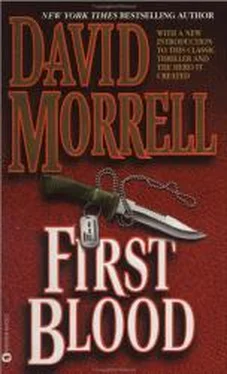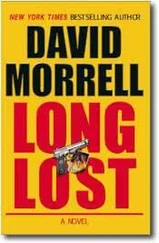'He hit me,' the man was groaning. 'He hit me. I'm hit.'
Well, so am I, buddy, but you don't hear me whining about it, he thought and since he could not accept merely waiting for the men in the siren cars to come for him, he began crawling again. Into a dry wading pool at the center of the playground. Into the center of the wading pool. And there his nerves tingled, stretched to life, and gradually registered his pain. Teasle's bullet had torn through his cracked ribs, and it was like lancing a giant fester, poison spewing forth. The pain grew to overwhelm him. He was scratching at his chest, clawing, ripping. He shook his head, clenched his body, so convulsed with pain that he raged to his feet up out of the wading pool, head stooped, shoulders hunched, tottering toward the fence at the edge of the playground. It was low, and he leaned over it gasping, kicked his feet in the air; in a grotesque somersault came down on the other side, expecting his back to hit ground; instead snagged thorns and leafless branches. A field of brambles. Wild raspberries. He had been here before. He did not remember when, but he had been here before. No. No, he was wrong. It was Teasle who had been here before, up in the mountains, when he had escaped into that whole slope of brambles. Yes, that was it. Teasle had gone in. Now it was the other way around. Now it was his own turn. The barbs dug him. They felt so good, helping him to rip at his pain. Teasle had escaped this way, through brambles like these. Why couldn't he?
Teasle lay on his back on the concrete of the sidewalk, ignoring the flames, staring up fascinated at a yellow streetlight. If this were summer, he thought, there would be moths and mosquitoes flying around the bulb. Then he wondered why he had thought that. He was losing his stare, blinking now, holding both hands over the hole in his stomach. It amazed him that except for a compulsive itch in his intestines, he had no sensation. There was also a big hole in his back, he knew, but that too was just an itch. So much damage and so little pain, he thought. Almost as if his body no longer belonged to him.
He was listening to the sirens, first a few, then a cluster of them, wailing somewhere beyond the fire. Sometimes they sounded far off, sometimes just down the street. 'Just down the street,' he said to hear himself, and his voice was so distant that his mind had to be separate from his body. He moved one leg, then the other, raised his head, arched his back. Well then, at least when the bullet had gone through, it had not shattered his spine to break his back. The thing is though, he told himself, you're dying. That big a hole and this little pain, you're dying all right, and that too amazed him — that he could think about it so calmly.
He glanced away from the streetlight toward the burning courthouse, even its roof on fire, toward the police station, flames seething out every window. And I just had those inside walls painted, he thought.
Someone was beside him. Kneeling. A woman. An old woman. 'Is there anything I can do?' she gently asked.
You're some old woman, he thought. All this blood and still you made yourself come to me. 'No. No, thank you,' he said, his voice very distant. 'I don't believe there's anything you can do. Unless. Did I hit him, do you know? Is he dead?'
'He fell I think,' she said. 'I'm from the next house down. By the station. I'm not sure exactly about it all.'
'Well,' he said.
'My house is catching fire. The people in this house, someone was shot I think. Can I get you a blanket? Some water? Your lips are dry.'
'Are they? No. No, thank you.'
It was certainly fascinating, his voice far off, but hers close, unfiltered against his eardrum, and the sirens, oh the sirens, wailing louder deep inside his head. It was all reversed, him outside of himself, but everything out there within him. Fascinating. He had to tell her about it. She deserved to know. But when he looked she was gone, and it was like a ghost had been with him. What kind of sign was it that he didn't know when she had gone? The sirens. Too loud. Shrieking like knives through his brain. He raised his head and looked between the fires down toward the bottom of the town square, police cars veering around the corner down there, speeding this way up the street, flashers whipping. Six, he counted. He had never seen anything with such distinct clarity, each detail in pure focus, especially each color of the light, flashers quick intermittent red, frontbeams constant glaring yellow, men behind the windshields orange in the shimmering radiance of the flames. The vision was too powerful. It set the street spinning, and he had to close his eyes or be sick. That would be all he needed. To retch and tear his stomach more, and maybe die right there before he could discover how this would end. It was a grace that he had not already been sick. He was long overdue. Hold together. That was all he could do. If he was going to die, and he was sure that he was, he could not let it come over him just yet. Not until the end.
He heard their tires squealing, and when he looked again, they were braking with a lurch below the station, policemen jumping out before the cars were at full stop, sirens ebbing. One policeman pointed up the street toward him, and they all came running between the fires, shielding their faces from the heat, shoes scuffling on the pavement, and in among them he saw Trautman. They had their guns drawn. Trautman had a pump shotgun that he must have taken from one of the cruisers.
Now he saw Kern among them too. Kern was telling a man, running as he spoke, 'Go back to the car! Radio for an ambulance!' Kern was pointing up and down the street, telling others, 'Get these people out of here! Push them back!'
What people? He did not understand. He looked, and dozens of people had materialized. Their abrupt appearance startled him. They were watching the fires. Something about their faces. They were crowding toward him, eyes aglow, bodies stiff, and he raised his hands to keep them away, irrationally afraid, about to cry, 'Not yet!' as the policemen reached him, blocking them off, encircling him.
'The kid,' he said.
'Don't talk,' Kern told him.
'I think I hit him.' He said it calmly. He concentrated, trying to imagine he was the kid. 'Yes. I hit him.'
'You need your strength. Don't talk. A doctor's coming. We would have been here sooner, but had to go around the fires on the—'
'Listen.'
'Relax. You've done everything you could. Let us handle it now.'
'But I've got to tell you where he is.'
'Here!' a woman screamed from the front lawn of the house. 'Back here! Get a doctor!'
'You eight come with me,' Kern said. 'Spread out. Half on that side of the house, half on this side. Be careful. The rest of you help scatter this crowd.'
'But he's not back there.' Too late. Kern and his men were gone.
'Not back there,' he repeated to himself. 'Kern. What's the matter with him that he can't listen?' It was just as well he had not waited for Kern to help that evening at the start of the chase, he decided. With Kern along, the posse would have been twice as confused, and the men Kern brought would have died with the others.
Trautman had not yet spoken. The few policemen who remained were trying to avoid the sight of all the blood. Not him, though.
'No, not you, Trautman. You don't mind the blood at all. You're used to it.'
Trautman did not answer, just kept staring.
One policeman said, 'Maybe Kern is right. Maybe you should try not to talk.'
'Sure, and that's what I told Orval when he was shot. But he didn't want to die quiet anymore than I do. Hey, Trautman, I did it. I said I would, didn't I? And I did.'
'What's he talking about?' the one policeman said. 'I don't get it.'
Читать дальше












